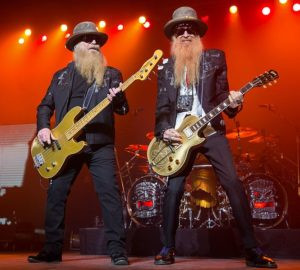ZZ Top, the legendary “little ol’ band from Texas,” has captivated audiences worldwide with their blues-infused rock and roll and, notably, their witty and often humorous lyrics. Among their extensive catalog of hits, “La Grange” stands out, not only for its infectious boogie rhythm but also for bringing a small Texas town and its intriguing secret to global attention. But what exactly is the story behind the “La Grange” song? Let’s dive into the history and meaning of this ZZ Top staple.
 ZZ_Top_2015_Ralph_Arvesen
ZZ_Top_2015_Ralph_Arvesen
The Shack Outside La Grange: Unveiling the Chicken Ranch
Penned by the band’s charismatic guitarist and vocalist, Billy Gibbons, ZZ Top’s lyrics are a masterclass in Texan storytelling. He expertly blends humor, regional flavor, and vivid imagery to paint pictures of often overlooked aspects of Texan life and culture. “La Grange,” released in 1973 as part of their Tres Hombres album, is a prime example. The song, at its heart, is about a “shack outside La Grange.” This wasn’t just any shack; it was the infamous Chicken Ranch, a brothel that operated near La Grange, Texas, from 1905 until 1973.
Operating discreetly as a simple farmhouse without overt signage, the Chicken Ranch was an open secret, functioning with the tacit consent of local authorities. Its notoriety extended beyond Texas, ultimately inspiring not only ZZ Top’s hit song “La Grange” but also the popular Broadway musical and subsequent film adaptation, The Best Little Whorehouse in Texas. The song immortalized this piece of Texas folklore, turning the Chicken Ranch into a legend within popular culture.
Beyond La Grange: ZZ Top’s Lyrical Wit and Texas Inspirations
ZZ Top’s lyrical genius extends far beyond “La Grange.” Many of their songs are steeped in similar wit, double entendres, and Texan-inspired storytelling. Take “Jesus Just Left Chicago,” another track from Tres Hombres. The title, seemingly quirky, originated from a real-life anecdote involving a friend of Gibbons, known as R&B Jr. During a phone conversation, R&B Jr. spontaneously uttered the phrase, which resonated with Gibbons and became the basis for a bluesy, Robert Johnson-esque 12-bar blues number. It seamlessly flows from “Waitin’ For the Bus,” creating a powerful opening duo for the Tres Hombres album.
The album Fandango! released in 1975, further showcased their lyrical playfulness with the song “Tush.” This track, featured on the studio side of the album, is rife with double meaning. “Tush,” pronounced to rhyme with “rush,” was often misheard as “touch.” The lyrical brilliance lies in the dual interpretation of “tush” – both slang for buttocks and a term for something luxurious or lavish. The line, “I ain’t askin’ for much…I’m just looking for some tush,” encapsulates this playful ambiguity, resonating with listeners on multiple levels.
 Billy_Gibbons_ZZ_Top_BBK_Live_2008_Alberto_Cabello
Billy_Gibbons_ZZ_Top_BBK_Live_2008_Alberto_Cabello
Double Entendres and Surfer Slang: More ZZ Top Lyrical Prowess
The double entendre became a signature element of ZZ Top’s songwriting. 1981’s El Loco album delivered more hits in this vein, including “Pearl Necklace.” Climbing to #28 on the Billboard rock charts, the song’s suggestive lyrics cleverly danced around the ambiguity of a “pearl necklace” – was it a sexual act or expensive jewelry? The final verse provides the humorous reveal: “it really don’t cost that much,” confirming the more materialistic interpretation.
“Tube Snake Boogie,” also from El Loco and reaching #4 on Billboard, initially seemed to follow a similar suggestive pattern with lyrics like, “I got a girl, she lives on the hill. She won’t do it but her sister will.” However, the true meaning is rooted in surfer slang, where “tube snake” refers to a surfboard. This playful twist reveals another layer of ZZ Top’s lyrical creativity, drawing inspiration from diverse subcultures.
Even when covering other artists, ZZ Top injected their unique style. On La Futura (2012), their rendition of “I Gotsta Get Paid” gained significant attention. Originally a hip-hop track by DJ DMD, Lil’ Keke, and Fat Pat (“25 Lighters”), ZZ Top, with engineer Gary Moon (who also worked on the original rap song), transformed it into a bluesier tune by incorporating Lightnin’ Hopkins-inspired licks. Gibbons himself noted the connection between blues and hip-hop, stating, “If blues is the highest of highs, lowest of lows and all points in between, what comes out runs right through hip-hop.”
Real-Life Tales and Texas Nights: The Stories Behind the Songs
Inspiration often struck from everyday life and conversations. The title “My Head’s In Mississippi,” for instance, emerged from a conversation between Gibbons and his friend Walter Baldwin in a Memphis tavern. Overlooking the Mississippi River, Baldwin poetically remarked, “We didn’t grow up pickin’ cotton. We weren’t field hands in Mississippi. But my head’s there.” This evocative statement became the title for another ZZ Top song, showcasing their ability to find musical inspiration in unexpected places.
“Arrested For Driving While Blind,” from the 1976 album Tejas, which peaked at #91 on the Billboard Hot 100, delves into the reckless side of teenage fun in the 60s. The song humorously addresses the then-common, albeit dangerous, practice of driving at night without headlights after drinking. While bassist Dusty Hill clarified that the song wasn’t intended to promote drunk driving, it captured a slice of youthful Texan experience, blending pleasure with potential pitfalls.
Lasting Legacy: ZZ Top’s Humorous and Bluesy Sound
ZZ Top’s most commercially successful album, Eliminator (1983), further cemented their status as music icons. MTV played their videos for “Gimme All Your Lovin’,” “Sharp Dressed Man,” and “Legs” relentlessly, introducing them to a new generation. Even amidst this mainstream success, Gibbons’ lyrical wit remained present, exemplified by “TV Dinners.” This humorous track nostalgically looked back at frozen TV dinners, with lines like, “I like the enchiladas and the teriyaki, too. I even like the chicken if the sauce is not too blue.”
For fans seeking a more blues-centric ZZ Top experience, Rio Grande Mud is often cited as their bluesiest album. While infused with Delta blues influences, it also hints at UK blues rock, particularly in “Just Got Paid.” The guitar riff cleverly reworks Fleetwood Mac’s “Oh Well,” transforming Peter Green’s licks into a blues anthem born from Gibbons’ own experience of being broke in Los Angeles.
From the legendary “La Grange” and its Chicken Ranch inspiration to their countless other witty and bluesy tracks, ZZ Top has carved a unique niche in rock and roll history. Their ability to blend humor, Texas culture, and blues roots into infectious songs continues to resonate with audiences worldwide, ensuring their legacy as true American music icons.

